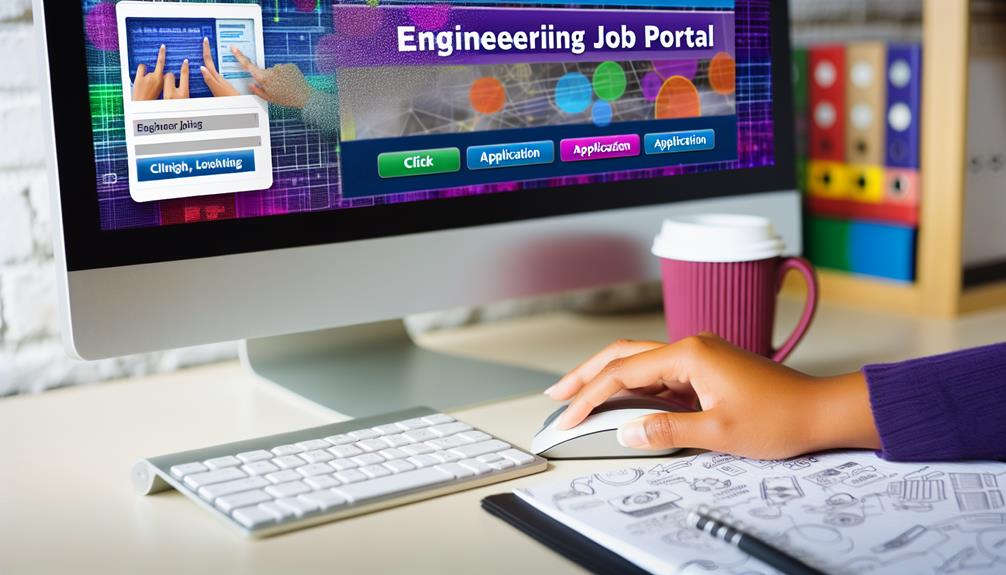How to Apply for Engineering Jobs in India
Finding an engineering job in India can feel like searching for a needle in a haystack, but it doesn't have to be that intimidating. You just need a strategic approach to navigate this competitive landscape effectively. From understanding the job market to tailoring your resume, each step plays an essential role in securing that position. So, what are the vital qualifications and skills you should focus on to stand out? Let's explore the key elements that can enhance your chances of success.
Key Takeaways
- Research and understand the job market, focusing on sectors with high demand and major cities for engineering jobs in India.
- Ensure you meet essential qualifications, including a relevant bachelor's or master's degree and necessary technical skills for your desired role.
- Utilize popular job portals like Naukri, Monster, and LinkedIn to search for and apply to relevant engineering vacancies.
- Tailor your resume to highlight technical skills, incorporate keywords from job descriptions, and showcase quantifiable achievements.
- Prepare for interviews by researching companies, practicing common questions, and emphasizing relevant experiences and problem-solving skills.
Understanding the Job Market
Steering through the engineering job market in India can be an exciting yet challenging experience. With over 149,000 vacancies available across various sectors like IT, manufacturing, and construction, the demand for skilled professionals is strong.
If you're looking for engineering jobs, you'll find that urban areas such as Mumbai, Bengaluru, Pune, Chennai, and Hyderabad offer the most opportunities. These cities are hubs for innovation and infrastructure projects, particularly in fields like civil engineering.
As you explore job roles, you'll notice a wide range, from entry-level positions like Engineering Executives to senior roles such as Engineering Managers. Each role has its own experience requirements, so it's important to know where you fit in.
The growth in engineering jobs is projected to continue over the next decade, spurred by advancements in technology and sustainability initiatives. This means upskilling is vital for staying competitive.
Salaries in the engineering sector can be attractive, starting at around ₹22,500 per month for entry-level roles and exceeding ₹87,500 for specialized positions.
Essential Qualifications and Skills

To secure a job in engineering, you'll typically need a bachelor's degree in a relevant field, with a master's degree often preferred for specialized roles. This foundational education is vital for most engineer jobs.
Depending on your focus, you may need technical proficiency in fields like civil, mechanical, electrical, or software engineering.
Strong problem-solving and analytical skills are essential. These abilities enable you to tackle complex challenges that arise in your projects, ensuring effective solutions and project success.
Additionally, familiarity with industry-standard software tools and technologies is increasingly important. As fields like automation and data analytics grow, being adept with relevant software can set you apart from other candidates.
Key Job Roles in Engineering

With a solid educational background and the right skills in place, you're ready to explore the diverse job roles available in the engineering sector. Each role requires specific levels of experience and expertise, so it's crucial to find one that matches your qualifications.
For instance, if you have 10-20 years of experience in manufacturing, consider positions like Factory Manager or Area Manager, where you'll focus on production management and plant operations.
If you're more experienced, with 12-20 years under your belt, roles like Lead Engineer or Engineering Manager might suit you, often requiring certifications like RCDD and involving extensive project management responsibilities.
If you're just starting out, entry-level roles such as Engineering Executive are perfect for you, requiring 0-3 years of experience and emphasizing supervision and safety training.
For those with a bit more experience, specialized roles like Instrumentation Engineer demand 6-11 years, particularly in industrial automation for large corporations.
Finally, if you're interested in the structural aspect, a Piping Stress Engineer role would also be a good fit.
Explore these options to find the right engineering path for you.
Top Employers in the Sector

The engineering landscape in India is vibrant, teeming with opportunities from a variety of top employers. Multinational corporations like Tata Consultancy Services, Infosys, Wipro, and Samsung C&T India Pvt. Ltd. are rapidly expanding their operations, creating a wealth of engineering roles.
Companies such as Jacobs, Accenture, and Amazon.com are also significant players, focusing on innovation and technology while hiring engineers across diverse specializations.
Fortune 500 companies, particularly in industrial automation like John Deere and PepsiCo, are on the lookout for candidates with specialized skills. These organizations provide a solid foundation for your engineering career, offering ample growth prospects.
Additionally, startups are making their mark by providing exciting opportunities to work on innovative solutions across various sectors, fostering creativity and entrepreneurship among engineers.
Don't overlook the impact of government projects in India, which play a crucial role in generating numerous engineering roles. Public sector initiatives are essential in shaping the job market, ensuring that there are plenty of options available for aspiring engineers.
Navigating Job Portals

Finding the right engineering job in India requires effective use of job portals, which serve as an essential bridge between you and potential employers. Start by utilizing popular platforms like Naukri, Monster, and LinkedIn, as they collectively list over 149,000 engineering job vacancies across various sectors.
To streamline your job search, set up job alerts on these portals. This way, you'll receive timely notifications for new openings that match your skills and preferences.
Regularly browse and filter job listings based on location, experience level, and specific engineering disciplines. This approach keeps you updated on the latest opportunities that fit your profile.
To enhance your visibility, consider leveraging resume display services offered by many job portals. This can increase your profile visibility up to three times, making it easier for recruiters to find you.
While maneuvering through these platforms, remember to emphasize relevant experience and technical skills in your applications. This focus will help you stand out in a competitive landscape.
Tailoring Your Resume

Customizing your resume to match the specific engineering role you're targeting can greatly increase your chances of landing an interview. Start by highlighting relevant technical skills, such as proficiency in software tools or programming languages like Java or Python, that align with the job description.
Incorporate keywords from the job posting to enhance visibility and guarantee your resume passes through applicant tracking systems used by employers. This not only helps in matching your qualifications with their needs but also demonstrates your attention to detail.
Quantifiable achievements and project experiences are vital. They showcase your problem-solving abilities and the impact you've made in previous roles or internships. For instance, mention how you improved a process by a certain percentage or successfully led a project within a deadline.
Confirm your resume is formatted clearly and professionally. A clean layout allows recruiters to quickly identify your qualifications and experience without sifting through clutter.
Preparing for Interviews

Preparing for engineering interviews involves more than just brushing up on technical skills; it requires thorough research and strategic practice. Start by diving deep into the company's background, projects, and culture. This knowledge not only shows your interest but can also set you apart from other candidates.
Next, focus on reviewing relevant engineering concepts for technical assessments. Employers often emphasize problem-solving abilities, so make sure you're comfortable with the core principles of your discipline.
Alongside technical preparation, practice common interview questions, both technical and behavioral. This will boost your confidence and enhance your communication skills.
Don't forget to highlight relevant experiences, internships, or projects on your resume that align with the job role. Employers appreciate candidates with practical exposure, as it demonstrates your hands-on skills.
Additionally, engage in mock interviews with peers or mentors. This practice allows you to refine your responses and gain constructive feedback, which is essential for improving your performance during actual interviews.
Networking Strategies

Building a strong professional network is essential for landing engineering jobs in India. Start by leveraging platforms like LinkedIn, where over 74 million users in India connect with industry professionals and potential employers. Create a compelling profile and actively engage with posts to increase your visibility.
Next, attend industry-specific events, workshops, and seminars in major cities like Bengaluru and Mumbai. These gatherings are goldmines for building relationships with key players in the engineering field. Make it a point to exchange contact information and follow up with new connections.
Joining engineering associations, such as the Institution of Engineers (India), can greatly enhance your networking opportunities. These organizations often provide access to job boards, networking events, and mentorship programs.
Don't underestimate the power of referrals. Reach out to current employees in engineering firms, as studies show referred candidates are more likely to be hired. This can elevate your profile in the eyes of recruiters.
Lastly, participate in online forums and discussion groups related to your engineering discipline. This not only keeps you updated on industry trends but also connects you with professionals who might share job openings.
Continuous Learning and Upskilling

In today's fast-paced engineering landscape, continuous learning is vital for staying competitive. With rapid advancements in technology and automation, you need to upskill regularly to keep pace. Consider pursuing certifications in specialized areas, like RCDD or Infor LN ERP; these can considerably enhance your employability and set you apart in a crowded job market.
Engaging in internships or project work is another effective way to boost your practical skills. This hands-on experience is highly valued by employers across various engineering fields.
Additionally, explore online courses and workshops that focus on emerging technologies, such as AI and sustainable practices. These will help you remain relevant and adapt to industry demands.
Networking with industry professionals is also essential. Participate in engineering forums and discussions to gain insights into new skills that are currently in demand. This not only helps you stay informed but also fosters continuous personal and professional growth.
Frequently Asked Questions
How Can I Get a Job as an Engineer in India?
To get a job as an engineer in India, start by exploring online job portals where thousands of vacancies await.
Tailor your resume and cover letter to highlight relevant skills and qualifications.
Don't underestimate the power of networking; connect with professionals in your field for potential referrals.
Keep learning and upskilling in areas like AI or renewable energy, and prepare for both technical assessments and soft skills evaluations during interviews.
How to Join Engineering in India?
Ever wondered what it takes to join the engineering field in India?
First, you've gotta earn a bachelor's degree in engineering from a recognized institution.
Focus on entrance exams like JEE to secure a spot in top colleges.
Don't forget to seek internships during your studies for practical experience.
Networking and attending workshops can open doors, while upskilling in emerging tech keeps you ahead in this dynamic industry.
Your journey starts now!
Can I Get Engineering Job in USA From India?
Yes, you can get an engineering job in the USA from India.
Start by enhancing your skills and gaining relevant certifications that U.S. employers value. Networking through platforms like LinkedIn and attending job fairs can open doors for you.
Focus on specialized areas like AI or data science, as companies seek these skills.
Are Engineering Jobs in Demand in India?
Yes, engineering jobs are in high demand in India.
With over 149,000 vacancies, various sectors like IT, manufacturing, and construction are seeking skilled professionals.
Urban areas, especially Mumbai, Bengaluru, and Hyderabad, offer the most opportunities due to economic growth.
The rise of automation and AI further fuels this demand, particularly in renewable energy and technology.
If you're considering a career in engineering, now's a great time to explore your options!
